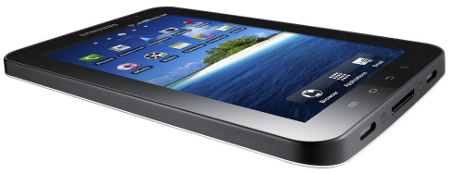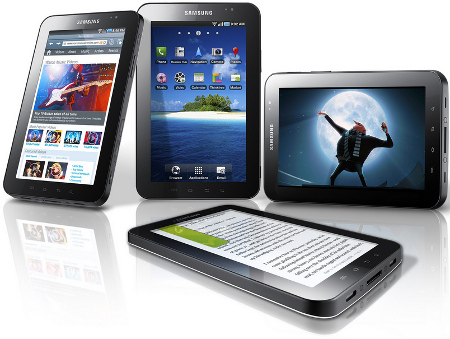Galaxy Tab reaches another network, gains mixed reviews
Nov 16, 2010 — by Eric Brown — from the LinuxDevices Archive — viewsAT&T will launch the Samsung Galaxy Tab Nov. 21, selling it for $650 plus $15 to $25 per month for data, says eWEEK. Meanwhile, reviews of the device range from the openly dismissive to the cautiously praiseworthy, with a consensus emerging that this first major Android tablet might be just good enough to make a major dent in iPad sales.
The Samsung Galaxy Tab will retail for $650 at AT&T stores and online on Samsung's website, writes Nicholas Kolakowski on our sister site, eWEEK. While some other U.S. carriers are selling the Galaxy Tab with a two-year contract, AT&T is offering two month-by-month plans similar to its pay-as-you-go plans for the Apple iPad, says the story.
Customers have a choice of paying $15 per month for 250MB of storage, or $25 for 2GB, and no long-term contracts are required, says the story.
 Other carriers offering the Galaxy Tab (pictured) include T-Mobile, U.S. Cellular, Sprint and Verizon. T-Mobile launched the device Nov. 10, beating Verizon and Sprint to market by a matter of days. The carrier is offering the tablet for $399 with a two-year plan or $599 without.
Other carriers offering the Galaxy Tab (pictured) include T-Mobile, U.S. Cellular, Sprint and Verizon. T-Mobile launched the device Nov. 10, beating Verizon and Sprint to market by a matter of days. The carrier is offering the tablet for $399 with a two-year plan or $599 without.
Meanwhile, a 10.1-inch Samsung tablet has been spotted in China, which may be an upcoming big brother to the seven-inch Galaxy Tab that competes more directly with the 9.7-inch iPad.
Two key reviews …
Over the last week or so, the Galaxy Tab has been heavily reviewed, with no clear consensus apparent either way. To paraphrase a number of evaluations, it may be the best Android tablet yet, but who cares? It's still not quite as good as an iPad.
The two reviews that arguably had the biggest impact were the David Pogue review in the The New York Times and the Walter Mossberg review in The Wall Street Journal. Both reviews were fairly positive, with the high price seen as the only major stumbling block by Pogue.
"Samsung sweated the details on this thing," writes Pogue in the Times. "The screen is gorgeous. The touch response is immediate and reliable. The whole thing is superfast and a pleasure to use."
Both reviews praise the performance and display, as well as Galaxy Tab features that were left off the iPad. These include voice to text dictation, multitasking capabilities, an SD slot, a second camera, and support for Adobe Flash. That said, each reviewer encountered some problems with Flash, and even greater difficulties with the Galaxy Tab's Qik videoconferencing software.

The Galaxy Tab is less than half an inch thick and weighs a slight 13.4 ounces (380 grams).
The iPad was the clear winner on battery life, lasting 11 hours and 28 minutes on one of Mossberg's multimedia-intensive tests, compared to six hours and 50 minutes on the Galaxy Tab.
The main drawback of the Tab in both reviews is price, although the iPad is also dinged as being on the expensive side. Both reviewers urge buyers to study the various data plans carefully, but even the best are too much, say the reviews.
As Pogue puts it, "With the Samsung Galaxy Tab, you're also buying delicious speed and highly refined hardware. It's just a shame that you're buying all that for $600."
As for Mossberg, he calls the Galaxy Tab an "attractive" device, and the first credible competitor to the iPad. In the end, however, the iPad wins.
.. and others (all over the map)
Sampling some of the dozens of other reviews of the Galaxy Tab, one finds evaluations ranging from "a pocketable train wreck" (Gizmodo) to "the best Android tablet on the market" (Engadget).
The negative reviews, such as the scathing Gizmodo write-up by Matt Buchanan and the highly critical review by ZDNet's Jason Perlow, mimic some of critiques from the Times and Journal, but go further.
Writes Buchanan, "This thing is just a mess. The browser is miserable, at least when Flash is enabled. It goes catatonic, scrolling is laggy, and it can get laughably bad. When better browsing is half the reason to go for a larger screen, that's insanity."
Buchanan goes on to call the Galaxy Tab "a compromise's evil twin, merging the worst of a tablet and the worst of a phone. It has all of the input problems of a tablet, with almost none of the consumption benefits."
Perlow's review on ZDNet is a bit more measured, referring to the Galaxy Tab "an impressive piece of technology." However, due to the high price, as well as rough edges, "particularly in the areas of the built-in cameras and its lacking support for video chat," Perlow turns his thumbs way down.
"I'm not seeing it as a keeper, and if you're expecting something analogous to an iPad you're definitely going to be disappointed," he concludes.

Galaxy Tab showing off web surfing, video, and e-reading chops
Engadget's Joanna Stern turned in one of the more positive reviews we've seen. This is due in part, perhaps, to the fact that Engadget has reviewed a lot of tablets recently, including some pretty iffy early contenders.
The review lauds the Galaxy Tab for its "crisp display, compact form factor, touch-friendly software, and dual cameras." Stern also praises the overall build quality, as well as the performance of the 1GHz Hummingbird processor.
"You don't have to worry about the sluggish performance we've seen on other Android and Windows tablets," writes Stern. "The entire experience is snappy, and it kept up with us even when we had four or five applications open."
The high-resolution touchscreen is also a standout, says the review. "The Tab doesn't have a Super AMOLED screen like its Galaxy S smartphone brothers, but the 1024 x 600-resolution LCD is still stunning," writes Stern. "It's notably better than most other tablet screens we've seen of late, which, of course, means that the first thing we noticed was its stellar viewing angles."
While calling the Galaxy Tab the best Android tablet on the market, Stern falls short of an unabashed product recommendation. She suggests that most buyers should wait until Android and Android apps are optimized for the big screen, and Samsung makes some more software refinements.
iFixit teardown: Fast processor, but disappointing camera
Repair site iFixit tore down the Samsung Galaxy Tab, discovering a speedy processor and a disappointing camera. The review focuses primarily on build quality and maintainability.
While some have complained that a $600 device should not be fabricated of mere plastic, iFixit praises the decision as "a good move toward ideal wireless reception." In short, the plastic design enables Samsung to more easily avoid reception issues that have troubled the iPad, says the story.
While praising the Galaxy Tab for performance, iFixit says the camera is not up to snuff. "The 3.2-megapixel rear-facing camera with an LED flash is a bit sub-par for a device of this caliber, seeing how much smaller devices (like the original Droid) are packed with five-megapixel imagers," says the review.
Analysts: Good enough to steal market share
Android-based tablets now hold around 2.9 percent of the worldwide tablet market, according to research firm Strategy Analytics, although the majority of those devices have yet to appear on the market. Samsung predicts it will sell more than one million Galaxy Tabs by the end of the year. Can it lead Android into double digit market share?
Just maybe, say a number of analysis stories appearing on eWEEK over the last week. eWEEK's Don Reisinger sees the Galaxy Tab as being a strong rival to the iPad for a number of reasons. These included the raging momentum and popularity of Android, as well as the Galaxy Tab's greater feature set compared to the iPad. In addition, the size differentiation plays well in a product category that is predicted to be quite large, and Samsung is offering the Galaxy Tab across more major U.S. carriers, giving it a major advantage, says the story.
Meanwhile, eWEEKs Wayne Rash writes that even if the Galaxy Tab might not be all that its cracked up to be, the iPad is "sure to lose market share." The demand is big enough, especially for cheaper Android tablets, that the iPad will need to work harder to compete, he suggests. And other platforms such as Windows, MeeGo, and WebOS may cut into the pie as well.
Despite some analysts' expectations of a burgeoning tablet market over the next few years, at least one analyst thinks that short-term sales of the devices could be softer than expected.
"We do not see Tablets go[ing] the way of netbooks,"Ashok Kumar, an analyst with Rodman & Renshaw, wrote in a widely dispersed November research note to clients. "But if current trends continue, the Tablet market may not end [up] as much more than iPads or a tweener product between smartphones and next-generation thin-and-light notebooks a la MacBook Air." He also suggested that the Dell Streak and Galaxy Tab are experiencing low sell-through rates.
This article was originally published on LinuxDevices.com and has been donated to the open source community by QuinStreet Inc. Please visit LinuxToday.com for up-to-date news and articles about Linux and open source.